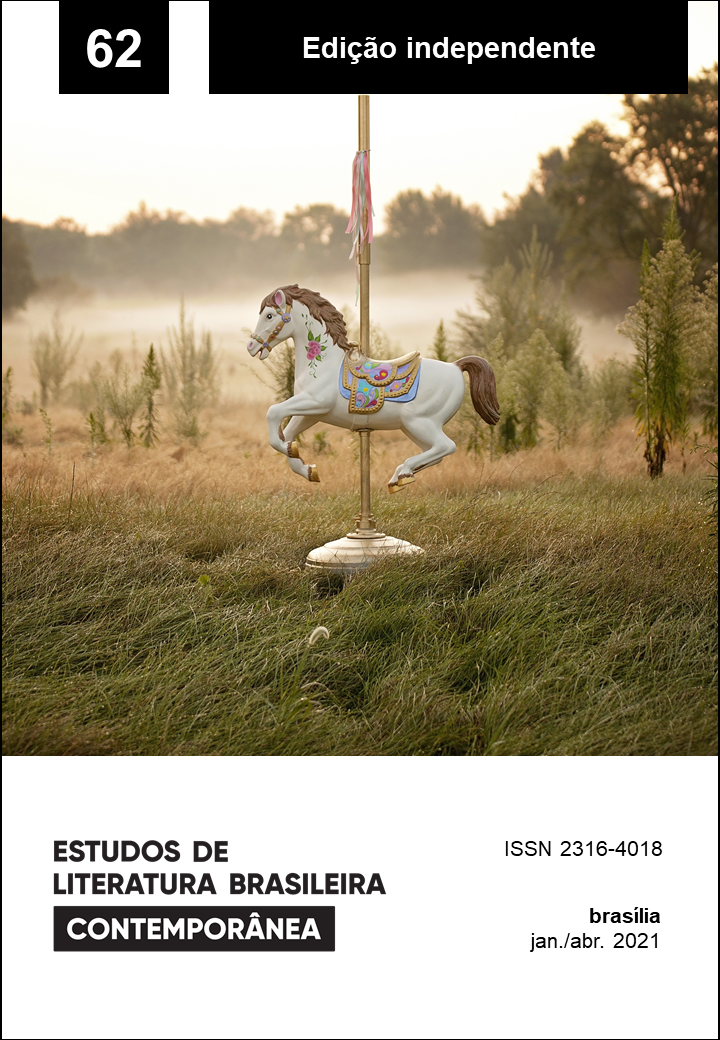Cartoneras Publishers and Literature Outside the Canon: A Critical Look at the Margins of the Publishing World
DOI:
https://doi.org/10.1590/2316-4018622Keywords:
cartoneras, independent publishers, subalternity, literary fieldAbstract
The purpose of this article is to provide an overview of the many possibilities for intervention of the cardboard book movement, an international network formed by independent publishers who use recycled cardboard to make the covers of their books. Starting from a presentation of the historical context out of which emerged the pioneering Eloísa Cartonera – an artisanal publisher that employs cardboard scavengers and individuals on the margins of society to edit works of beginning authors as well as those of great names of Latin-American literature – the text presents a reflection on the creative power of otherized subjects and on the processes of the subalternized on the periphery of capitalism making their voices heard. Through an ample collection of data from different sources (books, catalogs, blogs, websites and interviews), an attempt was made to construct a more complex image of the universe of cartoneras publishers and to discuss the impact of the intervention of this cooperative and solidary network of publishers in the processes of reconfiguration of the literary field. This is a descriptive study based on different publishing experiences to try to attain a greater understanding of the current disputes over the dominion of society's expressive machines, in particular those that traditionally guaranteed the production and diffusion of hegemonic representations through the book object.
Downloads
References
BECKER, Howard S. (2008). Mundos da arte. Tradução de Luis San Payo. Lisboa: Livros Horizonte.
BOURDIEU, Pierre (1999). A economia das trocas simbólicas. Introdução, seleção e organização Sergio Miceli. Tradução de Sergio Miceli et al. 5. ed. São Paulo: Perspectiva.
CARNEIRO, Daniele; ROCHA, Juliano (2019). Sobre livros cartoneros: experiências em publicação de livros de papelão. Curitiba: Magnolia Cartonera.
CERTEAU, Michel de (2003). A invenção do cotidiano: 1. Artes de fazer. 9. ed. Tradução de Ephraim Ferreira Alves. Petrópolis: Vozes.
CHARTIER, Roger (1999). A aventura do livro: do leitor ao navegador. Tradução de Reginaldo Carmello Corrêa de Moraes. São Paulo: Editora Unesp.
CUCURTO, Washington (2008). 1810: la Revolución de Mayo vivida por los negros. Buenos Aires: Emecé.
CUCURTO, Washington (2015). La serie negra. Buenos Aires: Paisanita Editora.
DALCASTAGNÈ, Regina (2012). Literatura brasileira contemporânea: um território contestado. Vinhedo: Horizonte; Rio de Janeiro: Editora da UERJ.
DALCASTAGNÈ, Regina; MATA, Anderson Luís Nunes da (Org.) (2012). Fora do retrato: estudos de literatura brasileira contemporânea. Vinhedo: Horizonte.
DIEGO, José Luis de (2010). Un itinerario crítico sobre el mercado editorial de literatura en Argentina. Iberoamericana, v. 10, n. 40, p. 47-62. Disponível em: https://bit.ly/3bVAXuv Acesso em: 18 fev. 2020.
DRUCAROFF, Elsa (2011). Los prisioneros de la torre: política, relatos y jóvenes de la postdictadura. Buenos Aires: Emecé.
FINOTTI, Ivan (2000). Bem-vindo ao "fundo do mundo". Folha de S. Paulo, Ilustrada, São Paulo, 6 jan. Disponível em: https://www1.folha.uol.com.br/fsp/ilustrad/fq0601200006.htm Acesso em: 18 fev. 2020.
JESUS, Carolina Maria de (2019). Clíris: poemas recolhidos. Organização de Raffaella Fernandez e Ary Pimentel. Rio de Janeiro: Desalinho; Ganesha Cartonera.
KINTÊ, Akins (2007). Enfoque subjetivo. In: KINTÊ, Akins; SOUZA, Elizandra (2007). Punga. São Paulo: Edições Toró.
LARRAZ, Fernando (2014). ¿Un campo editorial? Cultura literaria, mercados y prácticas editoriales entre Argentina y España. Cuadernos del CILHA, ano 15, n. 21, s.p. Disponível em: http://bit.ly/2NnA0RE Acesso em: 18 fev. 2020.
LOBO, Andréa Carneiro (2019). Prefácio. In: ALMEIDA, Marcelo Henrique Barbosa de. O que são esses livros com capas de papelão?: aspectos da história dos livros cartoneros – 2003-2018. João Pessoa: Marca de Fantasia. p. 7-9.
LUDMER, Josefina (1984). Las tretas del débil. In: ELENA GONZÁLEZ, Patricia; ORTEGA, Eliana (Ed.). La sartén por el mango. Encuentro de Escritoras Latinoamericanas. Río Piedras: Ediciones Huracán. p. 47-54.
MANGUEL, Alberto (2005). Os livros e os dias: um ano de leituras prazerosas. Tradução de José Geraldo Couto. São Paulo: Companhia das Letras.
PONT LALLI, Raúl Marcó del; VILCHIS SCHÖNDUBE, Cecilia (2012). Editores independientes jóvenes. In: GARCÍA CANCLINI, Néstor; URTEAGA, Maritza (Org.). Cultura y desarrollo: una visión crítica desde los jóvenes. Buenos Aires: Paidós. p. 91-133.
SANTIAGO, Silviano (1982). Vale quanto pesa: ensaios sobre questões político-culturais. Rio de Janeiro: Paz e Terra.
SOUZA, Lívia Santos de (2014). Cartografias líquidas da narrativa argentina: antologias de novos autores e a reestruturação do campo literário. Dissertação (Mestrado em Literaturas Hispânicas) – Universidade Federal do Rio de Janeiro, Rio de Janeiro.
SPIVAK, Gayatri Chakravorty (2010). Pode o subalterno falar? Tradução de Sandra Regina Goulart Almeida et al. Belo Horizonte: Editora UFMG.
VICENTE, Kim (2005). Homens e máquinas: como a tecnologia pode revolucionar a vida cotidiana. Tradução de Maria Inês Duque Estrada. Rio de Janeiro: Ediouro.
Downloads
Published
How to Cite
Issue
Section
License
Copyright (c) 2021 Ary Pimentel

This work is licensed under a Creative Commons Attribution-NoDerivatives 4.0 International License.
Authors who publish in this journal agree to the following terms:
a) The authors maintain the copyright and grant the journal the right of first publication, the work being simultaneously licensed under the Creative Commons Attribution License-Non Commercial 4.0 which allows the sharing of the work with acknowledgment of the authorship of the work and publication this journal.
b) Authors are authorized to enter into additional contracts separately, for non-exclusive distribution of the version of the work published in this journal (eg publish in institutional repository or as a book chapter), with authorship recognition and publication in this journal.
c) Authors are allowed and encouraged to publish and distribute their work online (eg in institutional repositories or on their personal page) after the editorial process, as this can generate productive changes, as well as increase the impact and citation of published work (See The Effect of Free Access).
d) The authors of the approved works authorize the magazine to, after publication, transfer its content for reproduction in content crawlers, virtual libraries and the like.
e) The authors assume that the texts submitted to the publication are of their original creation, being fully responsible for their content in the event of possible opposition by third parties.


